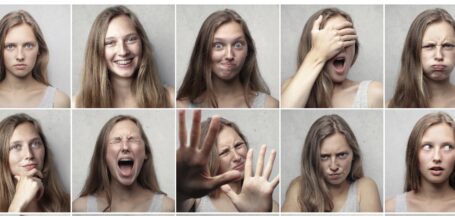“I can’t tell if you have a better life than me, or better photo filters” – Unknown
Unfiltered means not having been toned down, censored, or edited. It is the opposite of what many use more and more every day, especially on social media: filters. At first people usually start using filters to have fun; it’s a joke, a game, a virtual dress up. Filters are easy to use, funny to share with friends. But the other side of it is when people realise that when applying them to themselves, they make them feel better, or should we say “look” better. The truth about it is seems to be: We believe we look better and that makes us feel better. “The most widespread use of augmented reality isn’t in gaming: it’s the face filters on social media.” Tate Ryan-Mosley, MIT Technology Review, 2021
If you are wondering how we got there, here are just a few hints:
Augmented Reality appeared widely in the late 90’s and filters were used primarily as a tool for beautification. The first mobile phone with a front-facing camera was created in 1999, by a Japanese electronics manufacturer. In 2011 Snapchat was born, giving the possibility for its members to use lenses including the beautyfying ones. From then on, filtered selfies broke out to the mainstream.
Yet beauty filters, which are available and extremely popular on Tik Tok, Instagram, Snapchat, are not the only ones that are being used. Filters can also apply to content and people, all acting in a similar way.
We tend to think of our looks as separate from who we truly are. But it turns out that physical traits like height or attractiveness may actually shape our personality and our behaviours.
This happens for instance when we start believing what we want to perceive, and not what we see, choosing what we think suits us best. That’s when filters become reality. How can we not think that all this is having an effect on the social media posts we see, and therefore influencing the way we think and the things we do? In the last years, a public debate about the potential negative impact of lenses and filters has spread in society. Considering the power of filters today, we need to better understand and estimate their impact, and to find guardrails around their use.
So what do filters teach us about ourselves?
Maybe we should consider how technology is changing the way we form our identities, how we represent ourselves, and relate to others.
“I don’t think it’s just filtering your actual image, it’s filtering your whole life”, says Claire Pescott, researcher at the University of South Wales who studies the behavior of preteens on social media.
So we think we can fix ourselves with technology, become this beautified version or ourselves. But is that really safe? “In between that authentic self and digital self lives a lot of anxiety, because it’s not who you really are. You don’t look like the photos that have been filtered.” Says Krista Crotty, a clinical education specialist at the Emily Program, a leading center on eating disorders and mental health based in St. Paul, Minnesota. In addition, the self we project out there is immediately liked or disliked by the community so that we become addicted to the judgement of others and lose the connection with what makes sense to us. We need to come back to ourselves. To reconnect to who we really are and what really matters.
Institutions and organizations can offer an “unfiltered” environment, with a genuine feedback culture, non-judgemental, where psychological safety and mental health are priorities and people can grow.
The key here could be self-reflection. We could make a commitment to ourselves to quit “filtering” our lives…
Sources:
https://www.technologyreview.com/2021/04/02/1021635/beauty-filters-young-girls-augmented-reality-social-media/
https://www.bbc.com/future/article/20190619-how-your-looks-shape-your-personality
https://hbr.org/2021/12/research-how-ar-filters-impact-peoples-self-image

